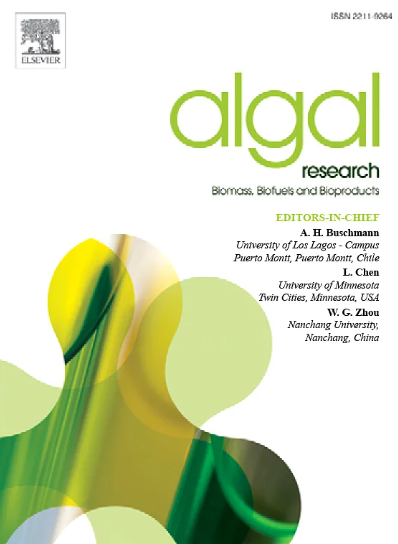Algae-based corrosion inhibitors as innovative approaches to corrosion prevention: A review
IF 4.6
2区 生物学
Q1 BIOTECHNOLOGY & APPLIED MICROBIOLOGY
Algal Research-Biomass Biofuels and Bioproducts
Pub Date : 2025-04-26
DOI:10.1016/j.algal.2025.104071
引用次数: 0
Abstract
Corrosion poses a significant threat to industries, lives, and property, making its management essential from technical, financial, environmental, and aesthetic perspectives. Corrosion inhibitors, particularly synthetic chemicals, are widely used but often toxic and costly. This has led to increased interest in eco-friendly alternatives, especially green corrosion inhibitors derived from algae extracts. Algae are abundant sources of biodegradable and non-toxic biomaterials, which have shown promise as effective corrosion inhibitors due to their unique chemical properties. Despite extensive research on green-based compounds in recent years, there is a lack of comprehensive reviews focusing specifically on algal extracts as corrosion inhibitors for metals. Existing reviews predominantly focus on terrestrial plant-based inhibitors or other bio-sourced materials, with only limited studies addressing algae-derived inhibitors. These studies are typically restricted to specific algae species or narrow experimental conditions, lacking comprehensive synthesis. This review uniquely bridges this research gap by providing a detailed analysis of both microalgae (e.g., Chlorella, Spirulina, etc) and macroalgae (e.g., Sargassum, etc) as sustainable corrosion inhibitors for ferrous alloys across various corrosive environments, including acidic and saline media. It systematically explores their mechanisms of action, advantages, limitations, and synergistic potential with other corrosion inhibitors. Furthermore, the present paper incorporates a comparative analysis of algae-derived inhibitors with traditional ones from various research studies, highlighting their distinct inhibition efficiency, biochemical properties, sustainability, and versatility. By addressing challenges such as compositional variability, stability, and scalability, this paper underscores the transformative role of algae-based inhibitors and encourages innovation in corrosion prevention strategies. The integration of recent findings consolidates evidence for their application in diverse corrosive media, positioning algae-derived inhibitors as a promising solution for sustainable industrial use.
基于藻类的缓蚀剂作为一种创新的防腐蚀方法:综述
腐蚀对工业、生命和财产构成重大威胁,因此从技术、财务、环境和美学角度对其进行管理至关重要。缓蚀剂,特别是合成化学品,被广泛使用,但往往有毒且昂贵。这导致人们对环保替代品的兴趣增加,特别是从藻类提取物中提取的绿色腐蚀抑制剂。藻类是生物可降解和无毒生物材料的丰富来源,由于其独特的化学性质,作为有效的缓蚀剂显示出前景。尽管近年来对绿色化合物进行了广泛的研究,但缺乏专门针对藻类提取物作为金属缓蚀剂的综合综述。现有的综述主要集中在陆生植物抑制剂或其他生物源材料上,只有有限的研究涉及藻类衍生的抑制剂。这些研究通常局限于特定的藻类种类或狭窄的实验条件,缺乏全面的综合。本综述通过详细分析微藻(如小球藻、螺旋藻等)和大型藻(如马尾藻等)作为铁合金在各种腐蚀环境(包括酸性和盐水介质)中的可持续缓蚀剂,独特地弥补了这一研究空白。它系统地探讨了它们的作用机制、优点、局限性以及与其他缓蚀剂的协同潜力。此外,本文还结合了各种研究中藻类衍生抑制剂与传统抑制剂的比较分析,突出了它们独特的抑制效率、生化特性、可持续性和多功能性。通过解决诸如组成可变性、稳定性和可扩展性等挑战,本文强调了藻类抑制剂的变革作用,并鼓励了防腐策略的创新。整合最近的发现巩固了它们在各种腐蚀性介质中的应用证据,将藻类衍生的抑制剂定位为可持续工业使用的有前途的解决方案。
本文章由计算机程序翻译,如有差异,请以英文原文为准。
求助全文
约1分钟内获得全文
求助全文
来源期刊

Algal Research-Biomass Biofuels and Bioproducts
BIOTECHNOLOGY & APPLIED MICROBIOLOGY-
CiteScore
9.40
自引率
7.80%
发文量
332
期刊介绍:
Algal Research is an international phycology journal covering all areas of emerging technologies in algae biology, biomass production, cultivation, harvesting, extraction, bioproducts, biorefinery, engineering, and econometrics. Algae is defined to include cyanobacteria, microalgae, and protists and symbionts of interest in biotechnology. The journal publishes original research and reviews for the following scope: algal biology, including but not exclusive to: phylogeny, biodiversity, molecular traits, metabolic regulation, and genetic engineering, algal cultivation, e.g. phototrophic systems, heterotrophic systems, and mixotrophic systems, algal harvesting and extraction systems, biotechnology to convert algal biomass and components into biofuels and bioproducts, e.g., nutraceuticals, pharmaceuticals, animal feed, plastics, etc. algal products and their economic assessment
 求助内容:
求助内容: 应助结果提醒方式:
应助结果提醒方式:


